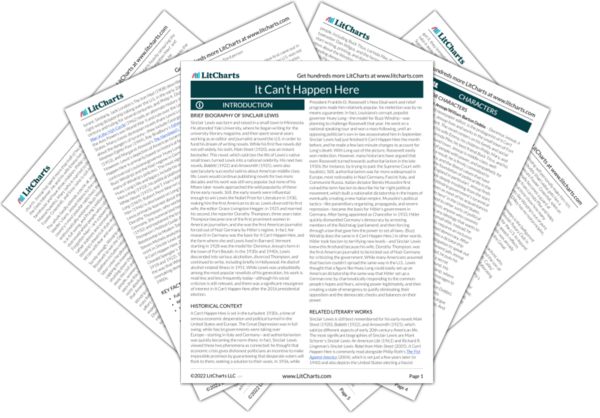Liberalism Quotes in It Can’t Happen Here
When Doremus, back in the 1920’s, had advocated the recognition of Russia, Fort Beulah had fretted that he was turning out-and-out Communist.
He, who understood himself abnormally well, knew that far from being a left-wing radical, he was at most a mild, rather indolent and somewhat sentimental Liberal, who disliked pomposity, the heavy humor of public men, and the itch for notoriety which made popular preachers and eloquent educators and amateur play-producers and rich lady reformers and rich lady sportswomen and almost every brand of rich lady come preeningly in to see newspaper editors, with photographs under their arms, and on their faces the simper of fake humility. But for all cruelty and intolerance, and for the contempt of the fortunate for the unfortunate, he had not mere dislike but testy hatred.
(15) Congress shall, immediately upon our inauguration, initiate amendments to the Constitution providing (a), that the President shall have the authority to institute and execute all necessary measures for the conduct of the government during this critical epoch; (b), that Congress shall serve only in an advisory capacity, calling to the attention of the President and his aides and Cabinet any needed legislation, but not acting upon same until authorized by the President so to act; and (c), that the Supreme Court shall immediately have removed from its jurisdiction the power to negate, by ruling them to be unconstitutional or by any other judicial action, any or all acts of the President, his duly appointed aides, or Congress.
The conspicuous fault of the Jeffersonian Party, like the personal fault of Senator Trowbridge, was that it represented integrity and reason, in a year when the electorate hungered for frisky emotions, for the peppery sensations associated, usually, not with monetary systems and taxation rates but with baptism by immersion in the creek, young love under the elms, straight whisky, angelic orchestras heard soaring down from the full moon, fear of death when an automobile teeters above a canyon, thirst in a desert and quenching it with spring water—all the primitive sensations which they thought they found in the screaming of Buzz Windrip.
“Is it just possible,” he sighed, “that the most vigorous and boldest idealists have been the worst enemies of human progress instead of its greatest creators? Possible that plain men with the humble trait of minding their own business will rank higher in the heavenly hierarchy than all the plumed souls who have shoved their way in among the masses and insisted on saving them?”
“I can do nothing of the kind! I can never forgive evil and lying and cruel means, and still less can I forgive fanatics that use that for an excuse! If I may imitate Romain Rolland, a country that tolerates evil means—evil manners, standards of ethics—for a generation, will be so poisoned that it never will have any good end. I’m just curious, but do you know how perfectly you’re quoting every Bolshevik apologist that sneers at decency and kindness and truthfulness in daily dealings as ‘bourgeois morality’? I hadn’t understood that you’d gone quite so Marxo-materialistic!”
[Doremus Jessup] saw now that he must remain alone, a “Liberal,” scorned by all the noisier prophets for refusing to be a willing cat for the busy monkeys of either side. But at worst, the Liberals, the Tolerant, might in the long run preserve some of the arts of civilization, no matter which brand of tyranny should finally dominate the world.
“More and more, as I think about history,” he pondered, “I am convinced that everything that is worth while in the world has been accomplished by the free, inquiring, critical spirit, and that the preservation of this spirit is more important than any social system whatsoever. But the men of ritual and the men of barbarism are capable of shutting up the men of science and of silencing them forever.”












